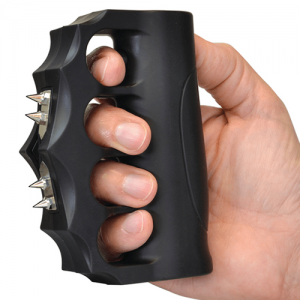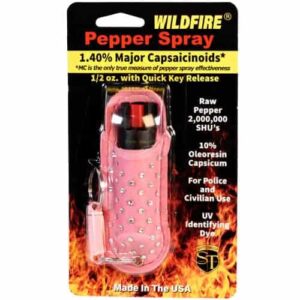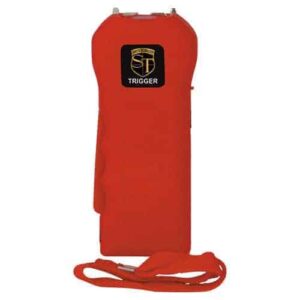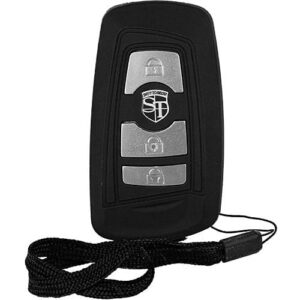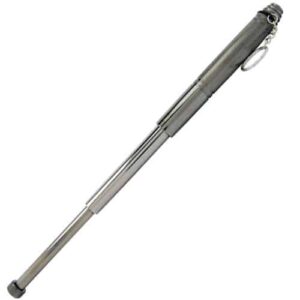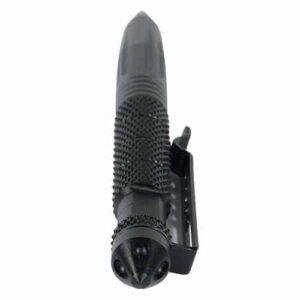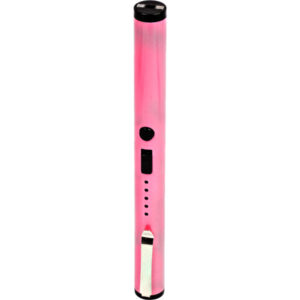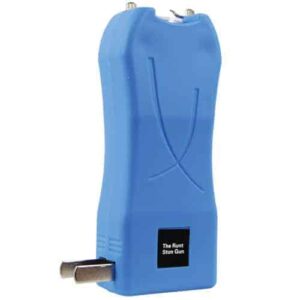In this enlightening piece titled “Pepper Spray Legal,” you are going to explore the intricacies of possession and use of pepper spray in different jurisdictions. You’ll examine the multi-faceted aspects of the law, ranging from the places where it is permissible to carry, to where and when it can be used legally, effectively outlining several factors that you need to consider in relation to self-defense. This comprehensive discussion about pepper spray legality will inevitably provide you with a fresh perspective and deeper understanding on individual rights and legal implications when it comes to personal safety.

Table of Contents
ToggleOverview of Pepper Spray
Pepper spray, also known as OC Spray (Oleoresin Capsicum), is a lachrymatory agent that inflames the eyes and causes temporary blindness, coughing, and choking. It is composed of a mixture of capsaicin, the active component of chili peppers, and a carrier medium like oil or water.
Definition of Pepper Spray
In more technical terms, pepper spray is a chemical compound that irritates the eyes and cause a burning sensation to the point of incapacitating a potential threat. Its effects range from mild irritation to temporary blindness allowing a potential victim an opportunity to escape or seek help.
Common Uses of Pepper Spray
Pepper spray is commonly used as a self-defense tool against humans and animals alike. It is widely popular among women, joggers, delivery people, and law enforcement personnel. As a non-lethal weapon, it provides an immediate yet temporary incapacitation, enabling the user to evade danger.
Types of Pepper Spray
There are several types of pepper spray, varying in size, concentration, and actuator design. The common types include stream, cone, fog, and foam or gel. Each type has a specific purpose, range, and dispersal method, requiring unique considerations during use.
Pepper Spray Legality
Federal Regulations
At the federal level, in the United States, the use of pepper spray for self-defense is legal. However, the container holding the pepper spray should not exceed a certain size, typically around 2.5 ounces.
State Laws Regarding Pepper Spray
While federal laws permit the use of pepper spray, specific state laws can differ widely. Some states place restrictions on the size, strength, and type of pepper spray residents can possess. Always check your local and state laws before purchasing or using pepper spray.
Restrictions on Pepper Spray
In some areas, there could be restrictions on where you can carry pepper spray, who can carry it, and under what circumstances it may be used. In many states, convicted felons and individuals with certain disorders might be prohibited from possessing or using pepper spray.
Legal Age Requirements
Most U.S. states stipulate that you must be at least 18 years old to purchase or use pepper spray. However, age requirements can vary from state to state.
Permitted Locations
Certain locations may prohibit the use or possession of pepper spray, including schools, government buildings, and public transportation. Always confirm the rules of your area.
Transportation and Packaging Regulations
When it comes to carrying pepper spray, some states dictate how it can be transported, and how it should be packaged. For example, some states require the spray to be sealed and enclosed within a protective package during transport.
Benefits and Advantages of Pepper Spray
Effective Personal Defense
Pepper spray can incapacitate an assailant quickly and efficiently, making it an effective self-defense tool.
Non-Lethal Option
Unlike firearms or knives, pepper spray is non-lethal, reducing the risk of severe or fatal injuries in self-defense situations.
Easy Accessibility
Pepper spray is easy to carry and can be accessed swiftly during an emergency.
Affordability
When compared to other self-defense tools, pepper spray is relatively affordable, making personal safety accessible to a larger population.
Deterrent Effect
The presence of pepper spray can act as a deterrent, discouraging potential attackers.
Limitations and Risks of Pepper Spray
Limited Range
Each pepper spray has a limited range, typically within 3-10 feet. This means close contact with the attacker is almost inevitable.
Effectiveness against Intoxicated or Mentally Impaired Individuals
Pepper spray may not be as effective against individuals under the influence of drugs or alcohol, or those with certain mental disorders.
Potential for Misuse
Like any weapon, pepper spray can be misused, causing harm to innocent people.
Wind and Environmental Factors
Environmental conditions such as wind can affect the range and accuracy of pepper spray. If wind blows the spray back towards you, you could become incapacitated instead.
Allergies and Health Concerns
Some people might be allergic to the ingredients in pepper spray, leading to severe reactions. Additionally, people with respiratory problems may face serious health risks when exposed to pepper spray.

Choosing the Right Pepper Spray
Strength and Concentration
The effectiveness of pepper spray largely depends on its strength and the concentration of OC. It’s important to choose a strength that is legal in your state, and sufficient for your defense needs.
Formulation – Spray, Gel, or Foam
Deciding between a spray, gel or foam largely depends on your comfort and the circumstances in which you’ll use it. Sprays produce a fine mist and have a wider range, while gels and foams are less affected by wind.
Laws on OC (Oleoresin Capsicum) Content
Laws vary by state regarding the OC concentration in pepper sprays. Make sure to confirm the legal limit within your location before making a purchase.
Spray Patterns and Dispersion
While sprays can cover a wide area, foams and gels need to be directed on the attacker’s face. Your choice depends on your ability to accurately direct the spray and the environment you are likely to use it in.
Size and Portability
Consider the size and weight of the pepper spray for easy carrying and swift access in emergencies. small units can clip onto a keychain while larger ones may come with holsters.
Additional Features (UV dye, Tear gas component, etc.)
Some pepper sprays include additional features like UV dye for suspect identification or tear gas for added incapacitation effects. Choosing these features depends on your specific requirements and the legalities in your region.
Proper Usage and Storage of Pepper Spray
Correct Technique for Deployment
Proper usage is crucial to ensure your safety. Training on the right technique to deploy the spray, such as aiming for the attacker’s face and moving in a sweeping motion, could make a difference during an emergency.
Safety Precautions
Being aware of wind direction, staying clear of the spray, and practicing the “fight or flight” mindset could minimize potential risks and improve your self-defense strategy.
Storage Guidelines
It’s vital to store the spray in a cool, dry place out of reach from children. Also, ensure it’s accessible in case of an emergency.
Maintenance and Expiration dates
Regularly Check the condition of your spray and note the expiration date. An expired pepper spray may be less potent and may not function as effectively.
Alternatives to Pepper Spray
Stun Guns and Tasers
Stun guns and tasers deliver a high-voltage electric shock that can immobilize an attacker, making them another non-lethal defense alternative.
Personal Alarms
These devices emit a loud sound that can scare away an attacker and attract attention to your situation.
Self-Defense Classes
Martial arts and self-defense classes can equip you with the necessary skills to protect yourself during an attack.
Safety Apps
These apps can share your real-time location with your family and friends or alert authorities in an emergency.
Pepper Spray and Law Enforcement
Pepper Spray Use by Police
Law enforcement personnel frequently use pepper spray in riot control or to subdue individuals who pose a threat. It allows them to maintain control while minimizing the risk of grave injuries.
Restrictions on Law Enforcement Usage
Certain restrictions apply to the use of pepper spray by law enforcement, including where, when, and how it should be used. Non-compliance could lead to penalties or lawsuits for police misconduct.
Controversies and Human Rights Concerns
The use of pepper spray by law enforcement has been a topic of controversy due to potential misuse and the severity of the reaction it provokes. Some see it as a form of torture, leading to demands for stringent regulations on its use by law enforcement.
International Pepper Spray Regulations
Global Variations in Legality
The legality of pepper spray varies globally. Some countries, like Canada and the UK, strictly regulate its use, and in some cases, it’s completely banned.
Restrictions in Specific Countries
Some countries place restrictions on who can carry pepper spray, including its potency and size. Always research the local laws of any country you plan to visit.
Pepper Spray for Travelers
For travelers, understanding the local laws regarding the possession and usage of pepper spray is essential. Non-adherence could lead to legal actions, including detentions and fines.
Legal Responsibilities when Using Pepper Spray
Use in Self-Defense Situations
While pepper spray can be legally used in self-defense, using it as an offensive weapon could result in criminal charges.
Reporting Incidents and Cooperation with Law Enforcement
After using pepper spray, it’s essential to report the incident to the police and fully cooperate with their investigation.
Civil and Criminal Liability
If you misuse pepper spray, you could face both civil and criminal liability. Civil liability can lead to lawsuits and substantial damages, whereas criminal liability could result in fines, probation, or even jail time.



